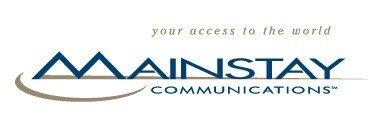Mainstay Communications’ all-fiber network leads to shared services and cost savings. The year 2014 marked the year that Mainstay Communications accomplished our goal to have fiber to every home in our exchange. We set the goal of a fiber connection to every home in 2001 with the idea that if we had fiber, we would be able to provide any future services that would come along mainly anything that had to do with IP or internet protocol services. That was a good idea because it seems like everything is an internet protocol (IP) based service.
Homes now require more internet broadband than ever before. This increase in demand has come along with school-issued computers to each student who now need to use the internet more for school assignments. Along with the computers, there are tablets, smartphones, HDTVs, Blu-ray Disc Players, video game consoles, and streaming media set top boxes that all need to share a home internet connection. According to Rebecca Grant at venturebeat.com, American homes have more Internet-connected devices than people. U.S. homes now have more than half a billion devices connected to the internet, according to a study by the NPD Group. Furthermore, the overall number of connected devices per household is 5.7; this is more than twice the average number of people per household. The proliferation of connected devices is primarily fueled by tablet sales although PC penetration is still the highest at 93 percent.
To make sure all these devices and all these homes have enough broadband, Mainstay Communications is connected to the World Wide Web backbone with a 1 Gigabit connection. To give you an idea how much a 1 Gigabit connection is, with all the internet users in the Henderson exchange we have a peak usage of 20% so far. This leaves us with 80% of unused bandwidth available to be used as more and more things are done on the internet.
Not only did we finish cutting over every home in our exchange to fiber, we installed a new IP switch in the central office replacing the 26 year-old digital DMS-10 switch in 2014. This new switch has the capability to evolve from the old public switched network to voice over internet protocol using the internet to make calls. You can see that it has been an IP revolution around here, fiber–done, IP switch–done, cable TV–working on it.
Not until we had fiber to each home was there a solution to replace our aging cable TV system. Our cable TV system has been in service since 1982; the life of a cable TV system like ours should have been around 15 years. We were able to squeeze an additional 17 years out of it as our system has been in service for 32 years. By extending the lifespan, we saved on the cost of installing underground copper cable to upgrade the cable TV system. The advantage of keeping our system going for so long was the economical savings to the company and our subscribers. By keeping the system going, we have watched the Cable TV industry go from analog signal to digital signal to high definition TV to IPTV often referred to as (Internet Protocol TV). The advantage of waiting until the newest delivery of video over the internet (IPTV) was available is that we did not invest in technology that is now old technology. The cost to upgrade to digital TV would have been half a million dollars which is now falling behind IPTV capabilities. The problem of affordability still existed with IPTV as the IPTV investment in equipment can be up to one million dollars for a company like ours. The only acceptable solution was to share the cost of providing IPTV with another company. There were a few companies providing IPTV in Nebraska but none that we could connect to directly to keep cost down until Hamilton Telecommunications and Mid-State Community TV began providing IPTV in Aurora in March of 2014. We contacted Hamilton Telecommunications and started the process of a joint collaboration to deliver Cobalt TV, their IPTV product, to Mainstay Communications subscribers. I was excited to announce at our December open house that Mainstay will be providing Cobalt TV in cooperation with Mid-State Community TV, Inc. and Hamilton Telecommunications to our subscribers available to everyone in our exchange. By combining Mainstay Communications fiber network and Hamilton’s IPTV video and working together, Mainstay Communications is able to offer Cobalt TV, which features over 300 channels of premium picture quality. We can now offer Cobalt TV to replace our old cable TV and for our rural subscribers Cobalt TV is an option to satellite TV. The plan is to convert all cable TV customers to Cobalt TV by March 30, 2015. Cobalt TV allows us to offer 129 Standard Definition channels, 101 High Definition channels, 44 movie channels, and 50 music channels delivered to the home with the premium clarity allowed by our fiber network.
By reaching out and working with other companies, Mainstay Communications is able to provide services that by ourselves would not be possible. In the future, I believe this will be the normal business model for broadband companies who are able to work together providing shared services and keeping cost down for their customers. I want to thank all the subscribers that have signed up for Cobalt TV and invite everyone to come and take a look at the quality of Cobalt TV at our Mainstay Technology Center located at 1008 North Main Street.
Matt Friesen
General Manager
Mainstay Communications


































